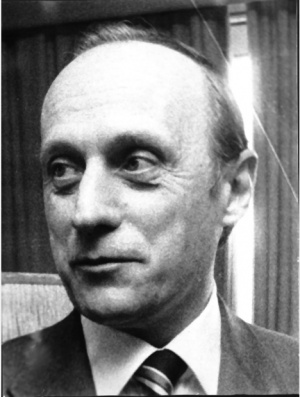Gianadelio Maletti
(soldier, spook) | ||||||||
|---|---|---|---|---|---|---|---|---|
 | ||||||||
| Born | 30 September 1921 Milan, Italy | |||||||
| Nationality | Italian | |||||||
| Citizenship | South Africa | |||||||
| ||||||||
General Giandelio Maletti is a general and former head of Italian counterintelligence.[1] He is one of the most senior participants in Operation Gladio to have been successfully charged for that operation. He became a naturalized South African citizen and escaped justice.
Contents
Background
Maletti's father was Major General Pietro Maletti, who was killed in Africa during the Second World War.
Career
Maletti joined the army and became an officer in 1967 as military attaché of the Italian embassy in Athens. On 15 June 1971, as a colonel, he was assigned to the SID, the Italian secret service, of which he later became head of the department "D" (counterintelligence).[2]
He was promoted to second in charge but had a conflict with the director of the SID, General Vito Miceli while Maletti was linked to US and Israeli intelligence. He was arrested on Miceli's orders in July 1974.
In October 1975 Maletti was deposed[3] by Defense Minister Arnaldo Forlani, but was appointed major general and placed in command of the 21th Infantry Division "Grenadiers of Sardinia".
Court proceedings
As a result of investigation into the Piazza Fontana bombing, on the February 28, 1976 Maletti and Captain Antonio Labruna were arrested on charges of assisting the escape of Giovanni Ventura, and of perjury[clarification needed] against Guido Giannettini and Marco Pozzan. After a two-year trial, the Court of Assizes of Catanzaro, February 23, 1979, Maletti was sentenced to 4 years imprisonment for aiding and abetting - reduced to two years on appeal on March 20, 1981.
Flight to South Africa
Maletti became a South African citizen in 1981, and took refuge in South Africa.
In 1987 the Court of Assizes of Appeal of Bari, after the reference from the Supreme Court confirms the final judgments.
In Alan Francovich's film on Operation Gladio, Guido Giannettini, who fled Italy during investigations into Gladio, stated "Maletti, let us say, helped me a lot even when I was abroad."[2]
2000 Interview
In 2000 from South Africa he gave an interview to the Italian newspaper La Republica, stating the CIA were heavily involved in the massacres committed by right-wing groups. He also said that he knew that explosives were being sent from Germany to an Italian neo-Fascist paramilitary group, something he reported to his superiors, but no action was taken. This was used in the massacre of Piazza Fontana. According Maletti purpose of this behavior was to create a strategy of tension to facilitate a coup of the sort which happened in 1967 in Greece. Maletti also reported that the CIS, although it had informed the government of the findings, was never asked to speak and that the CIA, through infiltrators and collaborators, served as a "link between different groups of the far right Italian and Germans". He was quoted as saying that the CIA, “following the directives of its government, wanted to create an Italian nationalism capable of halting what it saw as a slide to the left and, for this purpose, it may have made use of rightwing terrorism,” and that, “I believe this is what happened in other countries as well.”[4]
2001 Piazza Fontana massacre trial
Maletti was granted a safe passage back to Italy on 20 March 2001 to testify at the trial of a number of right-wing extremists accused of perpetrating the Piazza Fontana massacre. He testified that "The CIA, following the directives of its government, wanted to create an Italian nationalism, capable of halting what it saw as a slide to the left, and, for this purpose, it may have made use of right-wing terrorism."[5] When asked why he did not informed the judiciary, he said: "Until 1974, no one had explained that we had to defend the Constitution".
Entry to the P2 lodge
In 1981 his name is found in the list of members of the P-2[6], although Maletti denied his involvement with the lodge, claiming that he refused the invitation given him by Licio Gelli (whom he had known since 1973). This is contradicted by testimony of Antonio Labruna.[7]
Honors
He was given [When?] the Commander of the Order of Merit of the Italian Republic - ribbon for uniform ordinary Commander of the Order of Merit of the Italian Republic.
References
- ↑ Daniele Ganser, NATO's Secret Armies: Operation Gladio and Terrorism in Western Europe, Frank Cass, 2005, p.1.
- ↑ a b Operation Gladio (film)
- ↑ Carlo Lucarelli, Piazza Fontana, Torino, Einaudi, 2007, pp. 100-101, ISBN 978-88-06-18524-4.
- ↑ http://www.cbc.ca/news/world/cia-knew-but-didn-t-stop-bombings-in-italy-report-1.238336
- ↑ Daniele Ganser, NATO's Secret Armies: Operation Gladio and Terrorism in Western Europe, Frank Cass, 2005, p.6.
- ↑ (Rome, issue. 499
- ↑ http://libcom.org/library/appendix-j-interview-la-bruna